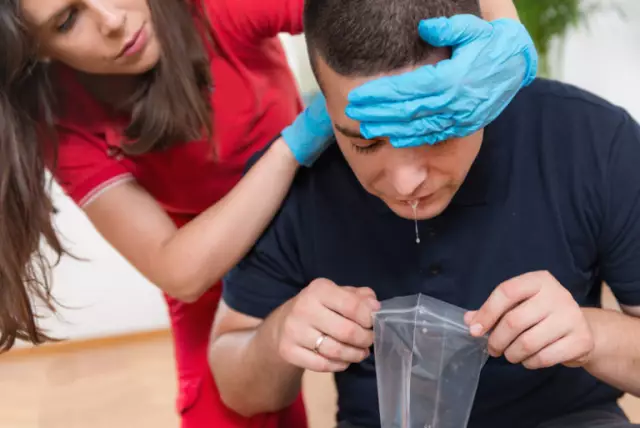- Author Rachel Wainwright wainwright@abchealthonline.com.
- Public 2023-12-15 07:39.
- Last modified 2025-11-02 20:14.
Vinegar poisoning
Table vinegar is a 9% acetic acid solution. In small doses, it is not dangerous to health, except that it is not recommended for use by people suffering from diseases of the digestive tract.

Source: xcook.info
Due to the pronounced smell, accidental poisoning with vinegar is almost impossible, with the exception of small children who, due to the negligence of adults, can drink vinegar left within their reach, mistaking it for water. Most often, acetic acid is taken deliberately for suicidal purposes, using strong solutions with a concentration of 30-70%. The lethal dose of such a solution is 100-150 ml.
How does acetic acid poisoning occur?
When taken orally, acetic acid has a local and general resorptive effect.
Local action is caused by a chemical burn of the mucous membrane of the digestive tract organs, their pronounced edema.
The general resorptive effect is associated with the absorption of acetic acid into the blood, which leads to hemolysis (breakdown) of erythrocytes. As a result, crystals of hydrochloric acid hematin are formed in the acidic renal environment, clogging the renal tubules, which leads to the development of acute renal failure.
Hemolysis of erythrocytes against the background of acetic acid poisoning also leads to damage to the blood coagulation system, that is, the development of disseminated intravascular coagulation syndrome (DIC).
Poisoning symptoms
The initial symptoms of acetic acid poisoning:
- chemical burns of the mucous membrane of the oral cavity, pharynx, pharynx;
- acute pain in the oral cavity, in the retrosternal region and epigastrium;
- repeated vomiting, vomit often mixed with blood;
- intense abdominal pain with signs of peritoneal irritation (reactive peritonitis);
- stridor (noisy, wheezing) breathing, the occurrence of which is caused by swelling of the larynx;
- red "lacquer" urine;
- decreased urine output.
Then, as the resorptive action manifests itself, the patient develops acute nephrosis with azotemia and anuria, hepatopathy, and the hemostatic system is disturbed. All organs and systems of the body suffer.

Source: depositphotos.com
First aid for poisoning
In case of acetic acid poisoning, it is especially important to provide first aid correctly, the life of the victim may depend on it.
First of all, the patient should rinse the mouth with clean cool water. This water must not be swallowed and must be spat out.
In case of acetic acid poisoning, under no circumstances should you rinse your stomach with the usual "restaurant" method or give the victim substances that have an emetic effect!
It is strictly forbidden to ingest a solution of soda, since as a result of a chemical reaction between soda and acetic acid, carbon dioxide is formed in large quantities, causing a sharp expansion of the stomach, which additionally injures the already damaged digestive tract.
With severe pain syndrome, you can give Almagel A, which contains anesthesin.
When is medical attention required?
As soon as it is discovered that a large amount of vinegar has been ingested, you should immediately call an ambulance or take the victim to the nearest emergency room on your own.
Upon admission, the patient immediately undergoes gastric lavage through a tube, using at least ten liters of clean water for this.
Further treatment includes:
- the appointment of narcotic and / or non-narcotic analgesics;
- carrying out forced diuresis with alkalinization of blood plasma;
- vitamin therapy;
- taking protein hydrolysates, blood preparations.
With the development of acute renal failure, accompanied by hyperkalemia, a significant increase in serum urea and creatinine, hemodialysis is indicated.
Severe breathing disorders caused by burns and laryngeal edema may require an urgent tracheostomy with subsequent transfer of the patient to mechanical ventilation.
Treatment of exotoxic shock is carried out according to generally accepted algorithms in the intensive care unit and intensive care unit.
Possible consequences
In the first hours after vinegar poisoning, 10% of victims experience acute perforations (violations of the integrity) of the stomach or esophagus.
Later complications are:
- cicatricial narrowing of the antrum of the stomach and esophagus;
- severe gastrointestinal bleeding;
- aspiration pneumonia;
- chronic renal failure;
- infectious and inflammatory complications (suppuration of burn surfaces, pneumonia, purulent tracheobronchitis);
- cicatricial changes in the cardiac and pyloric parts of the stomach;
- chronic gastritis;
- chronic cicatricial esophagitis;
- post-burn asthenia, accompanied by severe violations of acid-base balance, protein metabolism, a sharp decrease in weight.
The prognosis of vinegar poisoning largely depends on the quality and timeliness of the first aid provided, as well as on the dose of the poison taken and the changes in the body caused by it.
The most life-threatening period is the first day after poisoning, when death can occur against the background of peritonitis or exotoxic shock.
Prevention
To prevent possible vinegar poisoning, you should follow the safety rules:
- if possible, do not store the vinegar essence solution at home. It is best to dilute it with water in a ratio of 1:20 immediately after purchase or purchase ready-made table vinegar in the store;
- store the vinegar solution, and especially the vinegar essence, out of the reach of children, for example, on the top shelf of the kitchen cabinet. It is even better if the cabinet is locked with a key;
- when using acetic acid in the process of canning or preparing any dishes, you should carefully adhere to the dosage indicated in the recipe.
YouTube video related to the article:

Elena Minkina Doctor anesthesiologist-resuscitator About the author
Education: graduated from the Tashkent State Medical Institute, specializing in general medicine in 1991. Repeatedly passed refresher courses.
Work experience: anesthesiologist-resuscitator of the city maternity complex, resuscitator of the hemodialysis department.
The information is generalized and provided for informational purposes only. At the first sign of illness, see your doctor. Self-medication is hazardous to health!






